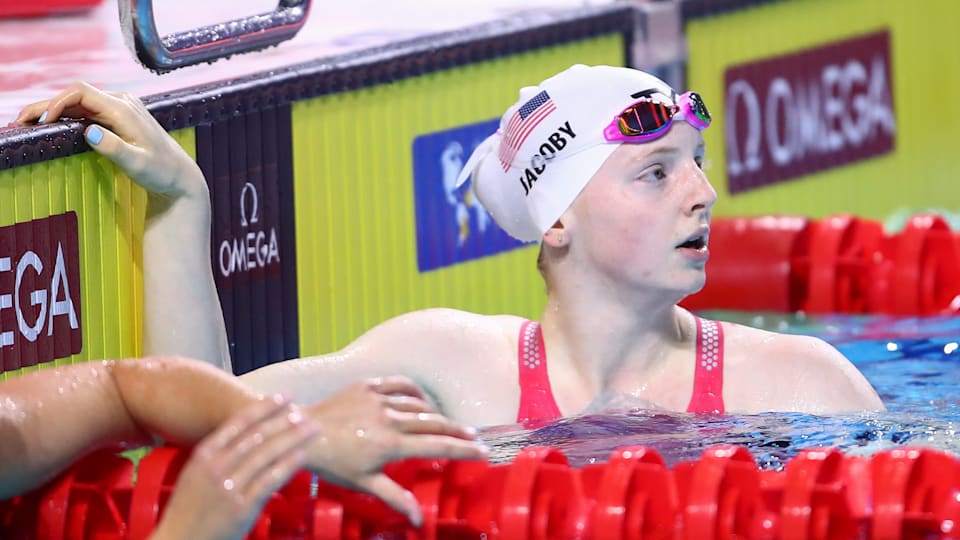USA swimming star Lydia Jacoby on identity struggle after winning Olympic gold: “I've always been really into art and creative things."
The Alaskan teenager tells Olympics.com how she struggled with being known as just a swimmer and athlete, and how painting, music, and fashion play a key role in her life.

Not many people know about it, but USA swimming star Lydia Jacoby has a passion for fashion and all things creative.
The Alaskan plays several musical instruments, paints, and will soon begin her studies in textile and apparel design at the University of Texas.
That side of her personality has just been well hidden to the public eye under her stunning achievements in the pool that include winning 100m breaststroke Olympic gold as a 17-year-old at Tokyo 2020 in 2021.
“I've always been really into art and creative things. So I was in a bluegrass and folk band for five or six years called Snow River String Band when I was younger. We haven't played together for a while now, but I play bass, piano, guitar, and I sing,” Jacoby told Olympics.com in an exclusive interview on video link.
The Alaskan doesn’t have to look far when with the national team for jamming buddies, should she want to get back into performing.
“There's quite a big group of musicians. I think Katie Ledecky is a piano player. Pretty incredible. Elizabeth Beisel plays the violin. And then I think there's some others. So yeah, we're fun to get a little group together some time," she continued.
With Caeleb Dressel a renowned keen drummer, Team USA could soon be making smash hits in addition to smashing swimming records.
READ: Lydia Jacoby exclusive: “I’ve swam with whales and sea lions but not in the way people imagine”
People are going to see me as a swimmer and as an athlete, but it’s been hard to have people only see that side of me
Music is just one piece of Jacoby’s creative puzzle.
“I really like collages. And then I also like painting,” she revealed to Olympics.com ahead of the U.S. Swimming World Championship trials.
After saying this, she jumped off her seat and came back holding a sentimental piece that she had recently made.
“I actually have my graduation cap right here that I just decorated and I did like a collage in the background. And then I have the longhorn and the Olympic rings on a wave. And then it says “Mamma Mia! Here we go again” because that's my favourite musical as well,” the 18-year-old continued with a smile.
But like some of the characters in the film, Jacoby has also struggled with losing her identity.
After her stunning performance in the Olympics, Jacoby’s public profile boomed and she was front and centre of the nation’s sporting media.
But she soon began to feel uneasy being known only as the swimming prodigy.
“This is something that I have struggled with actually with all the attention. Naturally, people are going to see me as a swimmer and as an athlete, but it’s been hard to have people only see that side of me," she revealed.
Fortunately, Jacoby always has Alaska to fall back on.
The outlier state doesn’t even have an Olympic-sized pool, and the people there know the teenager for her true personality in and out of the sport.
_“_I feel really lucky to have grown up in Alaska. It's a really small community, and I think that's one of the things that has made my swimming experience so special,” she said.
“I think a lot of bigger states have bigger teams and all that, so it's nice to grow up in a place where I had more support personally and more people knew me as a person rather than an athlete or a number.
“I think any high level of performance, be that athletic or anything else, can be overwhelming. So much of my life revolves around swimming. So it's nice to be able to come home and step into some different shoes and I think it's really important to separate your sport from your life so that you make sure not to make it all consuming and then get burnt out.”
Jacoby is, in fact, the first Alaskan to ever make the US Olympic swim team.
But despite the lack of top-class facilities and opportunities to become professional athletes in summer Olympic sports, the Seward native believes it actually helped her become an Olympic champion.
“I've just made it work and I've learnt to use that to my advantage. I don’t get as stressed out as some swimmers do with things like stroke rate during the race.
“I think that there is untapped talent to come out of these smaller communities.
“No matter where you live, I think it's important to remember that you can make it. Even if you don't have the most high-powered Olympic coaches or the most high-powered facilities, you can still find that support system and find that dedication within yourself and make it happen.”
